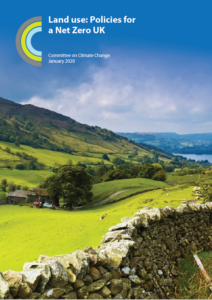New Committee on Climate Change report urges increase in perennial energy crops and woodland cover
 Last week the Committee on Climate Change (CCC) published a much heralded report called: Land use: Policies for a Net Zero UK.
Last week the Committee on Climate Change (CCC) published a much heralded report called: Land use: Policies for a Net Zero UK.
On the face of it it looks like really good news for the perennial energy crops sector. The CCC are encouraging the expansion of the land area under crops such as Miscanthus, Short Rotation Coppice (SRC) and Short Rotation Forestry (SRF) by 23,000 hectares per year.
The headlines from the report are as follows:
- Net Zero requires a transformation in land use across the UK. The report sets out a detailed range of options to drive emissions reductions in England, Scotland, Wales and Northern Ireland.
- Increase tree planting – increasing UK forestry cover from 13% to at least 17% by 2050 by planting around 30,000 hectares (90 – 120 million trees) of broadleaf and conifer woodland each year.
Encourage low-carbon farming practices – such as ‘controlled-release’ fertilisers, improving livestock health and slurry acidification. - Restore peatlands – restoring at least 50% of upland peat and 25% of lowland peat.
- Encourage bioenergy crops – expand the planting of UK energy crops to around 23,000 hectares each year.
- Reduce food waste and consumption of the most carbon-intensive foods – reduce the 13.6 million tonnes of food waste produced annually by 20% and the consumption of beef, lamb and dairy by at least 20% per person, well within current healthy eating guidelines.
We welcome the reports findings and are cautiously optimistic that this will lead to workable & farmer friendly policy decisions. Of course, we have been here before – many times! Please read my paper on the often chequered history of UK energy crops policy and schemes (A critical appraisal of the effectiveness of UK perennial energy crops policy since 1990). We can and we must learn from these previous false dawns.
The climate emergency clock is ticking! All the aspirations above are all realistically achievable as long as Govenment departments understand the need for investment in energy crops multiplication facilities and infrastructure. The investment risk needs to be shared in order to make it a viable enterprise.
In addition, to ensure that farmers take up this challenge, DEFRA and BEIS need to put into place a long term policy framework with schemes that on one hand have the highest levels of sustainabilty scrutiny whilst on the other provide ample financial rewards to land owners without tying them in bureaucratic knots.
Boris Johnson and Co – the ball is in your court – let’s see what you can do with it!